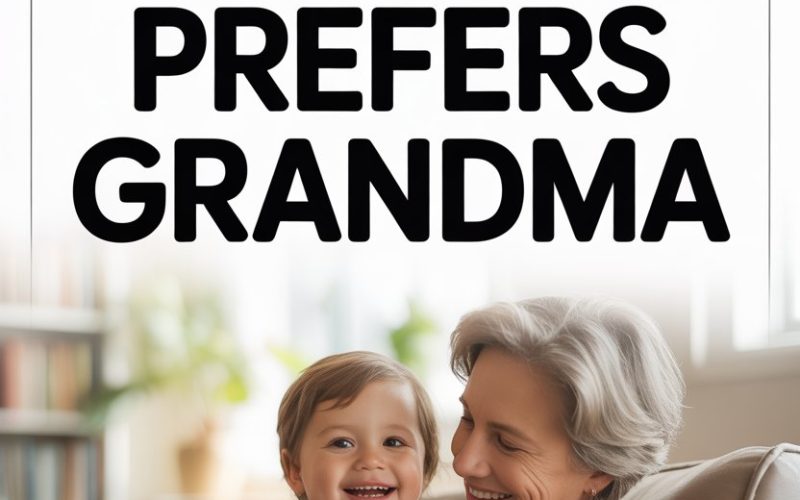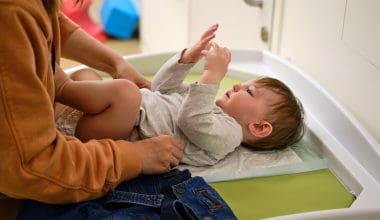Just when you thought you were the apple of your toddler’s eye, along comes Grandma—armed with her bottomless biscuit tin and a sixth sense for cuddles—claiming her spot as the reigning superstar.
If you’re feeling slightly usurped (and possibly eyeing that biscuit tin yourself), take a breath.
The toddler–grandma bond is as old as time, and it comes with some perks for everyone involved, even you.
The Magical Grandma Effect
Grandma doesn’t need parenting podcasts or a white-noise machine that sounds like a gentle womb. She comes equipped with something far more powerful: time, patience, and a well-worn bag of tricks.
Research has shown that strong grandparent–grandchild relationships can support children’s social and emotional development.
When Grandma steps in, she often creates a cosy space that feels both familiar and exciting—a combination that’s hard for even the most Pinterest-worthy playroom to beat.
It’s not just about the extra slice of cake (although, let’s not pretend that doesn’t help). Grandparents often have more emotional bandwidth than parents who are juggling a job, meal prep, and the fourth nappy change of the morning.
This means they can indulge in games that go for hours, read the same book until it’s practically memorised, and listen to a four-minute story about a particularly interesting pebble.
Toddlers Love Predictability—Grandma Delivers
Grandma’s house probably hasn’t changed much since the late 90s, except for a few more family photos and the addition of safety latches in the kitchen. For toddlers, this predictability is pure bliss.
Familiar routines—biscuits after nap, the special chair at the kitchen table—make little ones feel secure and in control.
While parents are often experimenting with kale chips or the latest bedtime routine, Grandma sticks to the tried-and-true.
This unwavering consistency soothes the toddler soul—a theory supported by child psychologists who note that rituals and routines provide young children with a sense of reliability and safety.
Grandma’s Yes Is Louder Than Your No
Let’s be honest. Grandma says yes to things that you’d veto in a heartbeat.
Another episode of Peppa Pig? Of course. A cookie before tea? Why not. The dog wearing a tutu? Absolutely.
Before you worry that your authority is being undermined, remember that toddlers are novelty seekers, and a ‘yes’ from Grandma feels like winning the lottery. This isn’t sabotage—it’s a different role.
Grandparents, according to experts from the University of Oxford, act as a “supportive buffer” in children’s lives, able to bend the rules a little and provide safe adventures, all while knowing that the big stuff (health, safety, boundaries) is still respected.
The Power of Undivided Attention
Mum and Dad are brilliant—but often, they’re multitasking at Olympic levels. Cooking with one hand, emailing with the other, and using a foot to nudge the potty closer.
Grandma, on the other hand, can give the kind of undivided attention that tunes in at full volume.
This one-to-one focus means every crayon scribble is admired, every knock-knock joke gets a hearty laugh, and every wobbly dance receives a round of applause. Toddlers absolutely lap it up.
Paediatric specialists at Zero to Three point out that responsive, attentive caregiving builds self-esteem and secure attachments.
Grandma’s superpower? Making each child feel like the centre of the universe—at least until her favourite soap comes on.
Nostalgia and Tradition: The Secret Ingredients
There’s something magical about Grandmas who pull out old toys from the attic or sing lullabies that have soothed generations. Toddlers might not grasp the full weight of family tradition, but they sure know when something feels special.
Maybe it’s the smell of a particular soup bubbling on the stove or the gentle way Grandma folds a blanket.
These sensory memories create a tapestry of comfort that toddlers crave, and they give children a sense of belonging to something bigger than themselves.
Research in family studies highlights that rituals, like baking together or Friday afternoon garden strolls, aren’t just fun—they lay a foundation for emotional security that can last a lifetime.
You Set the Boundaries—Grandma Gets to Play
Your job involves rules, timetables, and the delicate art of getting a toddler dressed before midday. Grandma’s brief? Play.
To a small child, that difference is absolutely thrilling.
Grandma’s role is one step removed from the everyday hustle, which means she can spend half an hour building a pillow fort or inventing new lyrics to “Wheels on the Bus”—without wondering whether anyone’s remembered to put the bins out.
This division of labour is good for everyone. It gives your child a chance to experience unconditional playfulness and gives you a moment to, perhaps, drink a cup of tea while it’s still hot. Miracles do happen.
Toddlers Sense Emotional Availability
Children might not have the vocabulary to discuss emotional labour, but boy, can they sniff it out. Toddlers are emotional barometers, and they seek out adults who seem fully present and available.
Grandma, having raised her own brood, often has more patience and perspective than she did the first time around.
Parenting experts say this ‘grandparent calm’ reassures young children, who are constantly testing boundaries and trying out their independence.
If your toddler makes a beeline for Grandma during a meltdown, it’s not a rejection of you.
It’s a sign that your child feels safe enough to reach out to another trusted adult. You’ve given them that security.
You’re Still Number One (Even If It Feels Like You’re Not)
Here’s a secret that only parents learn after a few years in the trenches: your child’s preference for Grandma is never a referendum on your parenting.
Children are natural collectors of love. They don’t divide affection; they multiply it.
When your toddler races into Grandma’s arms, what they’re really doing is expanding their circle of trust—and that’s a credit to you and your parenting.
Child development research backs this up. Secure attachment to multiple caregivers is linked to better emotional resilience. Your toddler’s adoration for Grandma only strengthens their bond with you.
Handling Your Own Feelings—With a Dash of Humour
If you find yourself feeling a twinge (or a full-on pang) of jealousy, you’re definitely not alone.
It’s perfectly normal to wonder why your carefully crafted bedtime routine is met with protests, while Grandma’s “bedtime story” has your little one snoring in five minutes flat.
The trick? Don’t take it personally.
Remember, your toddler still expects you to kiss hurts, find missing teddies, and produce snacks from thin air. No one can fill your shoes (even if Grandma has better biscuits).
And if all else fails, borrow a few of Grandma’s tricks yourself. There’s something to be said for a bribe of warm cookies after a long day.
Strengthening Your Own Bond—Tonight
If you’re itching to reclaim some of that toddler adoration—or just looking to avoid being upstaged at tomorrow’s family lunch—try these simple ideas:
- Pick a ritual: It could be anything from a silly song before bed to a “pancakes for dinner” night. Toddlers love repetition (and, well, pancakes).
- Offer undivided attention: Ten quality minutes reading a favourite book or building a block tower can work wonders.
- Say “yes” more often: Maybe not to everything, but the occasional rule-bending makes you feel like the fun one for a change.
- Share a family story: Even little ones enjoy hearing how you learned to ride a bike or what you were like as a toddler.
Small, consistent gestures build connection. And who knows? You might start to rival Grandma’s star power after all.
When Grandma Isn’t Available
Not every child has a hands-on granny in their life. For parents in this boat, don’t fret.
Any caring adult can step into a grandparent-style role—an aunt, a neighbour, or a family friend. The magic lies in that special, unhurried attention.
Plenty of children thrive on strong relationships with honorary grandparents, and the emotional benefits are just as real.
If you’re longing for more support, consider reaching out to intergenerational programs or local community groups, where these bonds can blossom.
Biscuit Tin Diplomacy
The next time your toddler sprints towards Grandma with open arms, remember: this isn’t a competition. It’s a family relay, and right now, Grandma’s just running a particularly delightful lap.
Your child is lucky to have another grown-up who loves them to bits—and you’re lucky for the occasional night off.
Besides, someone has to keep Grandma’s biscuit supply in check. It’s a tough job, but you’re up to the task.





